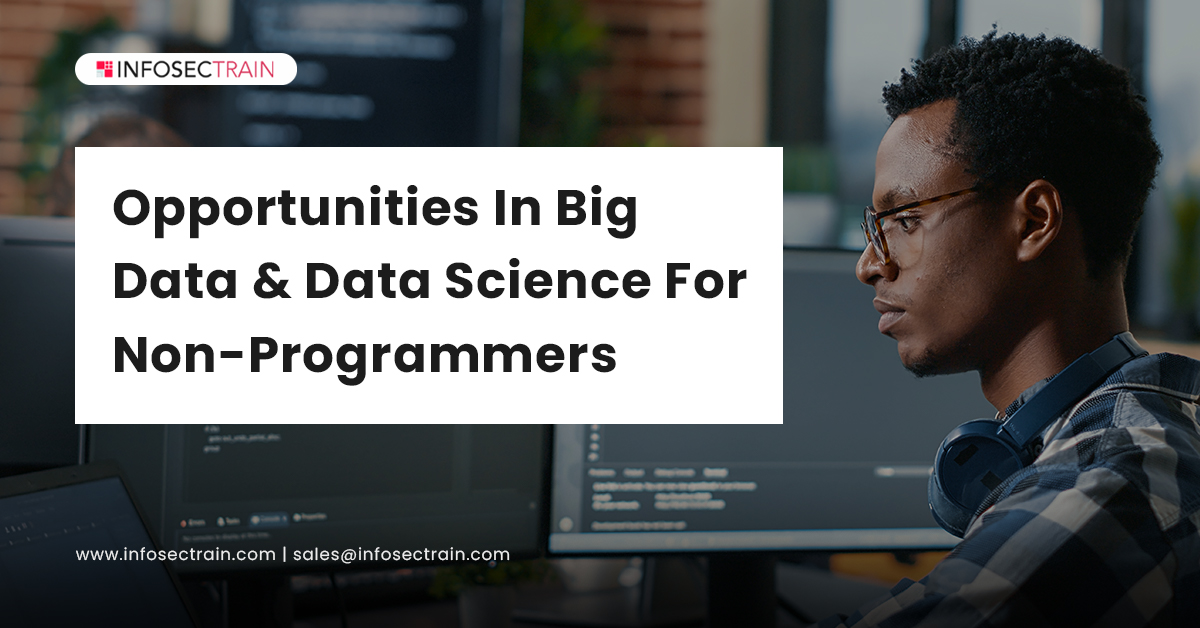Opportunities In Big Data & Data Science For Non-Programmers
Every two years or thereabouts, the entire volume of data on the globe doubles, and it will continue to grow. Businesses from a variety of industries recognize the importance of this ever-growing tsunami of data. They are analyzing and extracting insights from their historical and real-time data sets.

This has resulted in a rapid expansion and diversification of big data and data science roles, as well as a scarcity of qualified specialists. Due to this surge in job opportunities, individuals from diverse backgrounds, whether technical or non-technical, are looking for a career change in the big data and data science industry.
A decade ago, professionals believed that they were meant to advance their careers in the same industry where they started out in the first place. This was accomplished by gaining experience within the confines of their industry and applying solely what they learned at university.
However, in today’s rapidly changing employment environment, your career prospects and advancement are no longer tied to a single business, industry, or set of skills.
This article explores various opportunities in big data and data science for non-programmers.
However, before making a career change, you should consider why you want to do so in the first place to keep you motivated throughout your journey in big data and data science. Do you find that your daily routine no longer fulfills you? Do you want to step up your professional game? Are you looking for a higher-paying job?
Overview of big data and data science
Big data: Big data is a field concerned with techniques for analyzing, methodically extracting information from, or otherwise dealing with data volumes that are too enormous or complicated for typical data-processing application software to handle.
Data science: Data science is an interdisciplinary field that uses the process of cleansing, aggregating, and modifying data to undertake advanced data analysis.
We must distinguish between big data and data science before we go any further. The application of specialist data science technologies to large data sets is known as big data. Big data analysis, also known as data mining, deals with massive amounts of data. In contrast, data science uses machine learning methods to construct and develop statistical models to extract knowledge from a significant quantity of data.
Is programming necessary for big data and data science?
The ability to code is a must-have skill for any big data and data science professional. Because big data and data science are at the crossroads of analytics and engineering, it requires a mix of mathematics and programming skills. Big Data Analysts and Data Scientists with software expertise are in higher demand. In fact, the most critical skill for them has been identified as programming.
You can learn the required programming skills from various sources even if you do not know them yet. Start with Python, the most well-known and easy-to-learn programming language even for beginners.
However, there are a lot of professionals who have little to no programming skills or are from a non-technical background. Now the question arises, how do I pursue a career in big data and data science from a non-technical background?
Big data and data science tools for non-programmers
You do not need any programming knowledge to use big data and data science tools. Some of them are:

Career opportunities in big data and data science for non-programmers:
You do not need to be an expert programmer to work in the industry. However, it is expected that becoming a Data Scientist necessitates extensive coding knowledge. While this is also true for many data science positions, some jobs require little or no coding knowledge. Some of the career prospects for non-programmers are mentioned below:
- Sales Representatives: A Sales Representative is a person whose duty is to market a company’s products or services, usually in a specific area. A big data Sales Representative understands how to sell Big Data solutions, which are on the rise and will continue to be in the coming years.
- Data Management Analysts: Database and security system performance is monitored and maintained by Data Management Analysts. They are responsible for maintaining online databases and, in some cases, security systems for businesses. They will be in charge of data recovery, storage, and upkeep of a computer database. These individuals will oversee operations that protect or increase the value of data. They manage data movement across numerous systems, oversee validation and organization, and ensure that it is accessible to the proper people and systems inside a company.
- Data Science Strategy Consultant: Data science consulting is the act or process of educating customers on various aspects of data and modern technology. More precisely, consultants will improve a customer’s analytics skills and data competencies, as well as better structure their business’s machinations and workings. The strategy portion of the consulting is investigating what can be done with data and developing a strategy.
- Technical writer for data science software: We all use help functions and tutorials of tools and platforms because the data science process comprises various proprietary applications and platforms. A technical writer’s job is to write these documents. They must be familiar with software and data science, and their job is demanding. They collaborate with programmers, users, and marketing. The material must be generated and checked for accuracy, and the design and, lastly, legal standards must be met. You must be a full-fledged Data Scientist with a diverse set of interactions and expertise, but you do not need to know how to code.
- Data Science Project Manager: There is no simple solution to project management, as data science has the most difficulties. Data Science Project Managers are in charge of planning, designing, and implementing data science solutions. They assist in project risk and quality management. They are delivering on schedule and budget, based on requirements. By balancing project limitations, they may manage and communicate changes. They are ascertaining that the company is ready to adapt to the change.
- Data Visualization Expert: Setting up relevant and understandable reporting, as well as a fantastic data visualization that conveys the entire story to non-technical individuals, is an art. As a result, specialized employees are responsible for designing and maintaining accurate reporting and visualization in all data science teams of major corporations. Furthermore, most consulting businesses have an expert staff that assists their clients in doing so.
How can InfosecTrain help you in your journey?
The good news is that if you want to work in the big data or data science industry, you may learn by taking a variety of online courses. You need to pick one that will allow you to obtain practical data science and analytics knowledge and experience. You must select a program based on the time and financial resources available to you.
Consider taking a data science training course at InfosecTrain to learn about the information and abilities needed to land one of today’s hottest careers. The data science course is intended to have a 360-degree impact on your chances of success in the field. Stay focused, and you can accomplish any goal you want. We wish you the best in your journey!







 1800-843-7890 (India)
1800-843-7890 (India)